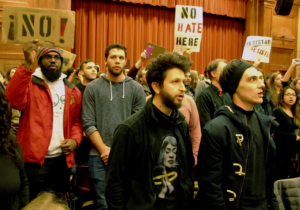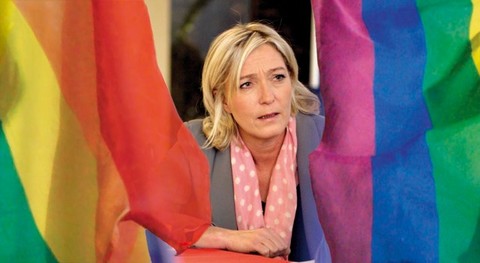 Cross-posted on The Corner.
Cross-posted on The Corner.
Looked at one way, the attempt to silence Charles Murray and the violence that followed it was nothing more than another chapter in a long power struggle, but there was something else about it, something more disturbing still.
Writing in New York magazine, Andrew Sullivan:
At around the 19-minute mark, the students explained why they shut down the talk, and it helped clarify for me what exactly the meaning of “intersectionality” is.
“Intersectionality” is the latest academic craze sweeping the American academy. On the surface, it’s a recent neo-Marxist theory that argues that social oppression does not simply apply to single categories of identity — such as race, gender, sexual orientation, class, etc. — but to all of them in an interlocking system of hierarchy and power. At least, that’s my best attempt to define it briefly. But watching that video helps show how an otherwise challenging social theory can often operate in practice.
It is operating, in Orwell’s words, as a “smelly little orthodoxy,” and it manifests itself, it seems to me, almost as a religion. It posits a classic orthodoxy through which all of human experience is explained — and through which all speech must be filtered. Its version of original sin is the power of some identity groups over others. To overcome this sin, you need first to confess, i.e., “check your privilege,” and subsequently live your life and order your thoughts in a way that keeps this sin at bay. The sin goes so deep into your psyche, especially if you are white or male or straight, that a profound conversion is required…
Like the Puritanism once familiar in New England, intersectionality controls language and the very terms of discourse. It enforces manners. It has an idea of virtue — and is obsessed with upholding it. The saints are the most oppressed who nonetheless resist. The sinners are categorized in various ascending categories of demographic damnation, like something out of Dante. The only thing this religion lacks, of course, is salvation. Life is simply an interlocking drama of oppression and power and resistance, ending only in death. It’s Marx without the final total liberation.
It operates as a religion in one other critical dimension: If you happen to see the world in a different way, if you’re a liberal or libertarian or even, gasp, a conservative, if you believe that a university is a place where any idea, however loathsome, can be debated and refuted, you are not just wrong, you are immoral. If you think that arguments and ideas can have a life independent of “white supremacy,” you are complicit in evil. And you are not just complicit, your heresy is a direct threat to others, and therefore needs to be extinguished. You can’t reason with heresy. You have to ban it. It will contaminate others’ souls, and wound them irreparably.
And what I saw on the video struck me most as a form of religious ritual — a secular exorcism, if you will — that reaches a frenzied, disturbing catharsis. When Murray starts to speak, the students stand and ritually turn their backs on him in silence. The heretic must not be looked at, let alone engaged. Then they recite a common liturgy in unison from sheets of paper. Here’s how they begin: “This is not respectful discourse, or a debate about free speech. These are not ideas that can be fairly debated, it is not ‘representative’ of the other side to give a platform to such dangerous ideologies. There is not a potential for an equal exchange of ideas.”
Sullivan’s article comes with a few nods to orthodoxy of its own, but the fundamental point he makes, which can be applied to many other religions beyond Puritan New England, not least to Marxism (itself a millenarian creed) and its offshoots, is very well worth noting.
And here, writing more explicitly from the left (his observations on the role that class has to play in what’s going on in the colleges of the elite is something to think about), in The American Scholar, is William Deresiewicz. If I had to guess the article was written before the events at Middlebury, but:
Selective private colleges have become religious schools. The religion in question is not Methodism or Catholicism but an extreme version of the belief system of the liberal elite: the liberal professional, managerial, and creative classes, which provide a large majority of students enrolled at such places and an even larger majority of faculty and administrators who work at them. To attend those institutions is to be socialized, and not infrequently, indoctrinated into that religion…
What does it mean to say that these institutions are religious schools? First, that they possess a dogma, unwritten but understood by all: a set of “correct” opinions and beliefs, or at best, a narrow range within which disagreement is permitted. There is a right way to think and a right way to talk, and also a right set of things to think and talk about. Secularism is taken for granted. Environmentalism is a sacred cause. Issues of identity—principally the holy trinity of race, gender, and sexuality—occupy the center of concern. The presiding presence is Michel Foucault, with his theories of power, discourse, and the social construction of the self, who plays the same role on the left as Marx once did. The fundamental questions that a college education ought to raise—questions of individual and collective virtue, of what it means to be a good person and a good community—are understood to have been settled. The assumption, on elite college campuses, is that we are already in full possession of the moral truth. This is a religious attitude. It is certainly not a scholarly or intellectual attitude.
Deresiewicz understands how this religion uses of the mechanisms of social control:
So it is with political correctness. There is always something new, as my students understood, that you aren’t supposed to say. And worst of all, you often don’t find out about it until after you have said it. The term political correctness, which originated in the 1970s as a form of self-mockery among progressive college students, was a deliberately ironic invocation of Stalinism. By now we’ve lost the irony but kept the Stalinism—and it was a feature of Stalinism that you could be convicted for an act that was not a crime at the time you committed it. So you were always already guilty, or could be made to be guilty, and therefore were always controllable.
There is always another sin.
Speaking of which, there was this in Reason:
A residential advisor at Pitzer College sent a campus-wide email informing students—white women, in particular—that they should stop wearing hoop earrings.

 Writing
Writing Cross-posted
Cross-posted The Independent:
The Independent: Cross-posted
Cross-posted 
 Opponents of assisted suicide often warn how legalizing it would represent a slippery slope. That’s not an argument convincing to those who have slid very far down a slope themselves.
Opponents of assisted suicide often warn how legalizing it would represent a slippery slope. That’s not an argument convincing to those who have slid very far down a slope themselves. Furlough in Jablonovka by the Austrian-Jewish writer Joseph Roth (1894-1939) includes a description of Christmas just behind the front lines of the Eastern front during Roth’s time with the Austro-Hungarian army during the First World War (the translation is by Michael Hoffman, and comes from The Hotel Years, a fine collection of some of Roth’s writing):
Furlough in Jablonovka by the Austrian-Jewish writer Joseph Roth (1894-1939) includes a description of Christmas just behind the front lines of the Eastern front during Roth’s time with the Austro-Hungarian army during the First World War (the translation is by Michael Hoffman, and comes from The Hotel Years, a fine collection of some of Roth’s writing): It was perhaps not that surprising that Pope Francis would look to involve himself in the controversy over ‘fake news’. The terms in which he did so were, however, unexpected….
It was perhaps not that surprising that Pope Francis would look to involve himself in the controversy over ‘fake news’. The terms in which he did so were, however, unexpected….